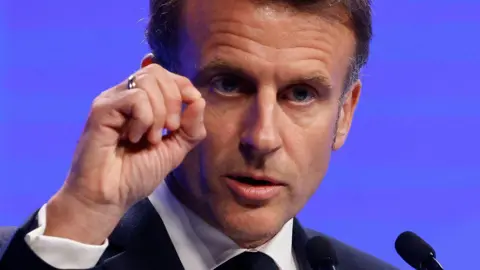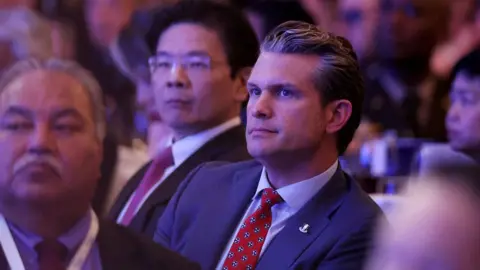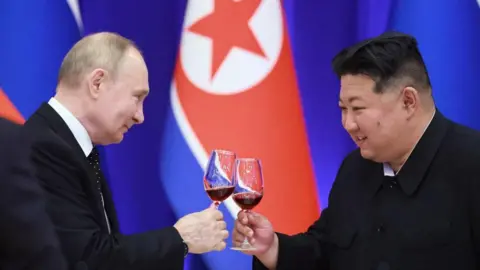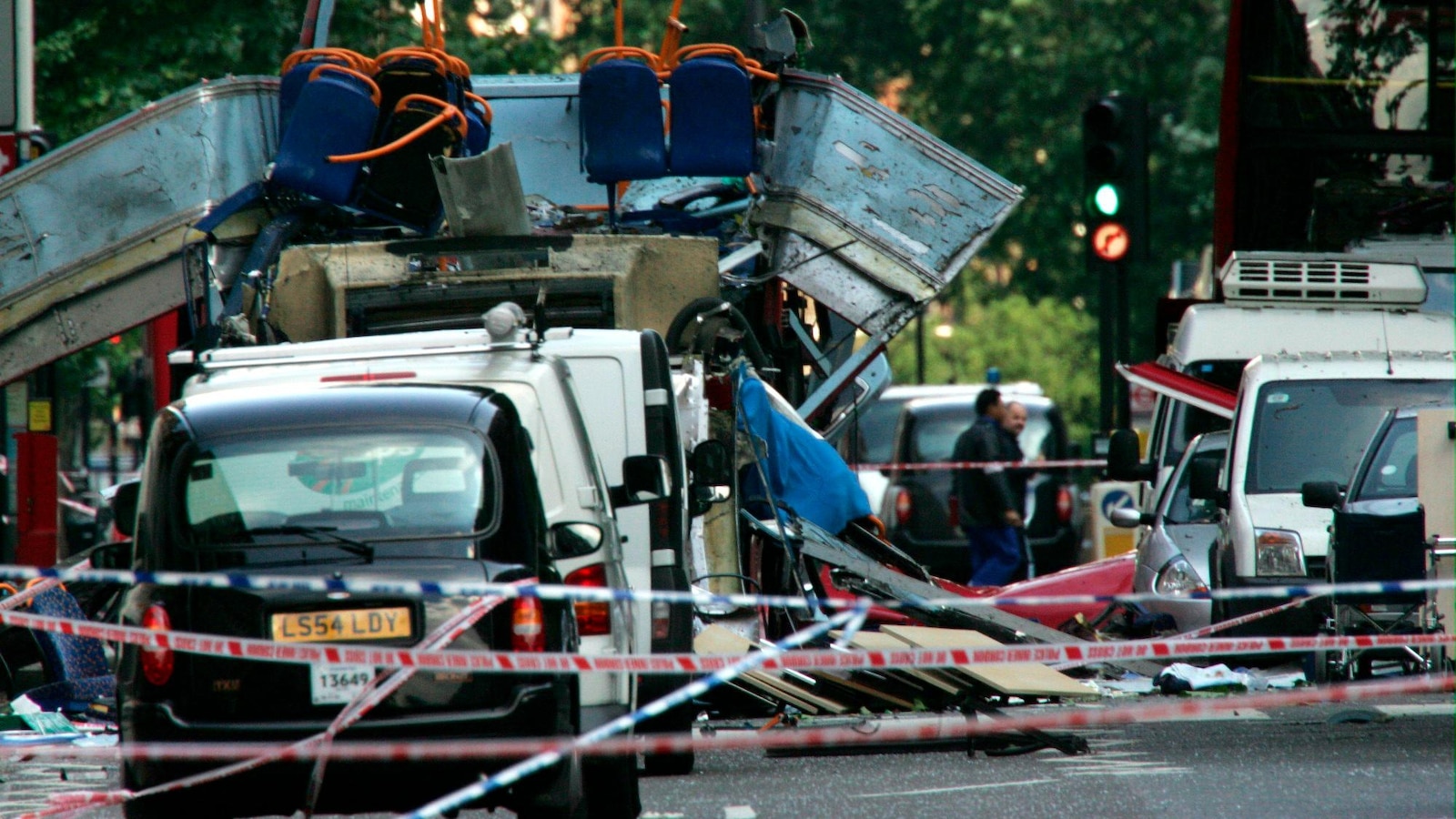ARTICLE AD BOX
Tessa Wong
Reporting fromShangri-la Dialogue, Singapore

 Getty Images
Getty Images
Macron was speaking at the Shangri-la Dialogue in Singapore
France's President Emmanuel Macron warned the US and Europe risked losing their credibility and being accused of "double standards" if they do not resolve the wars in Ukraine and Gaza soon.
He also appealed to Asian countries to build a new alliance with Europe to ensure they do not become "collateral damage" in the struggle for power between the US and China.
Macron was speaking at the Shangri-la Dialogue, a high-level Asia defence summit held in Singapore.
Among the guests listening were US Defence Secretary Pete Hegseth, as well as top military officials from the region.
Macron pointed out that if Russia could take Ukrainian territory "without any restrictions, without any constraints… what could happen in Taiwan? What will you do the day something happens in the Philippines?"
"What is at stake in Ukraine is our common credibility, that we are still able to preserve territorial integrity and sovereignty of people," he said. "No double standards."
Many in Asia worry of instability in the region should China attempt to forcibly "reunify" with Taiwan, a self-governing island that Beijing claims as part of its territory. China has also increasingly clashed with the Philippines over competing claims in the South China Sea.
Macron later answered a question posed by the BBC's security correspondent Frank Gardner on Europe's military role in Asia while a full-scale war was still raging on the continent.
"If both the US and Europeans are unable to fix in the short term the Ukrainian situation, I think the credibility of both the US and Europeans pretending to fix any crisis in this region would be very low," the French leader said.
US President Donald Trump has put increasing pressure on both Russia and Ukraine's leaders to end the war, and has appeared to give Vladimir Putin a two-week deadline. Trump has also previously berated Ukrainian leader Volodymyr Zelensky and accused him of being "not ready for peace".
Macron also made his point about double standards on the war in Gaza, acknowledging there was a perception the West has given a "free pass" to Israel.
He stressed the importance of working towards a ceasefire and mutual recognition of a Palestinian state, saying: "If we abandon Gaza, if we consider there is a free pass for Israel, even if we do condemn the terrorist attacks, we kill our own credibility in the rest of the world."
He said this was why it was "very important to be consistent and follow our principles and rules".
In recent weeks, European leaders have criticised Israel's attacks for exacerbating the increasingly desperate humanitarian situation in Gaza.
Last week, Israeli Prime Minister Benjamin Netanyahu launched a blistering attack on Macron and the leaders of Canada and the UK, accusing them of effectively siding with Hamas and being "on the wrong side of humanity".
Meanwhile the US has worked with Israel to table a ceasefire proposal to Hamas, while creating a much-criticised aid distribution model in Gaza.

 Getty Images
Getty Images
US defence secretary Pete Hegseth was in the audience listening to Macron
Macron also used his speech on Friday to sell his vision of "strategic autonomy", where countries protect their interests while also working closely together to uphold a rules-based global order not dominated by superpowers.
He touted France as an example of being friends with both the US and China while guarding its own sovereignty, and said this model could form the basis of a new alliance between Europe and Asia.
"We want to co-operate but we don't want to depend... we don't want to be instructed on a daily basis on what is allowed, what is not allowed and how our life can change because of a decision by a single person," he said, in what appeared to be a veiled reference to Trump or Chinese President Xi Jinping.
He also made references to Trump's global tariffs and allies' uncertainty of the US's security commitments, saying: "We cannot just remain seated and say… what do we do with tariffs, okay we are not so sure that we have the full-fledged guarantee in the existing alliance, what do we do?"
"We want to act, we want to preserve our stability and our peace and our prosperity," he said, calling for a "positive new alliance between Europe and Asia" where they would ensure "our countries are not collateral damage of the imbalances linked to the choices made by the superpowers".
He noted that both Europe and Asia's challenges were increasingly intertwined, and referenced the Ukraine war again where North Korea has been aiding Russia's efforts with thousands of its troops.

 Getty Images
Getty Images
North Korea has supported Russia in its war in Ukraine by sending thousands of troops
Macron said that in the past he had objected to the Western alliance Nato having a role in Asia, "because I don't want to be involved with someone else's strategic rivalry".
"But what's happening with North Korea being present alongside Russia on European soil is a big question for all of us," he said.
"So this is why if China doesn't want Nato involved in South-East Asia or Asia, they should prevent clearly [North Korea] from being engaged on European soil."
Mathieu Duchatel, director of international studies at the Paris-based think tank Institut Montaigne, said Macron's comments on credibility had "implied criticism of the US's Middle East policy, and a direct call on the US to adjust its diplomacy towards Russia".
Observers agree China would likely be angered by Macron's speech, with Dr Duchatel noting the French leader's comments on Taiwan were "the furthest he has gone" on the issue.
Some parts of Asia may welcome Macron's message on strategic autonomy given their anxieties about choosing between the US and China, said Andrew Small, senior fellow of the Asia-Pacific programme of Washington-based think tank GMF.
"His argument is that most of the rest of the world does not want to be stuck with this dichotomy and wants to hold together some version of global order - that's what a number of states in Asia would agree," he said.
Among several European and Asian states, Dr Small said, there was "genuine concern about how China will interpret a Russian victory" in Ukraine, while "the Trump administration takes a different view and is trying to make the case that there is no read across".
He added that Macron's mention of the recognition of a Palestinian state - on which France has been leading European efforts - was to signal "we are moving on this".

 1 month ago
180
1 month ago
180








 English (US) ·
English (US) ·